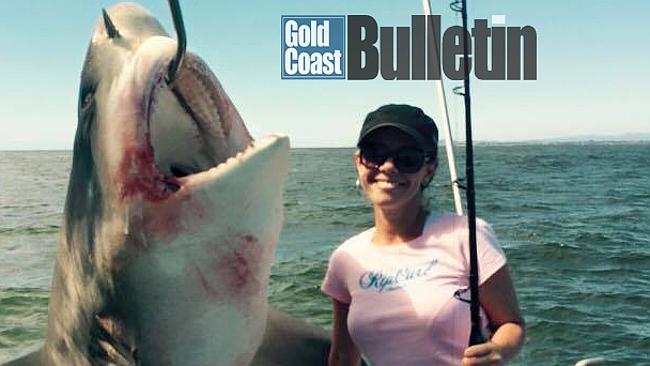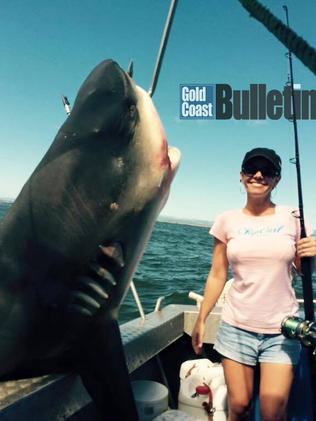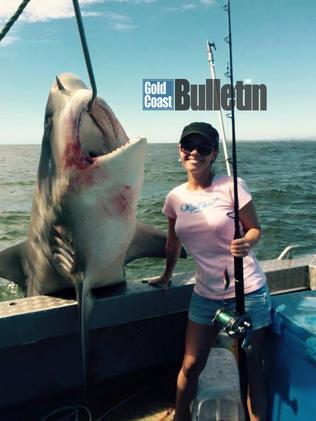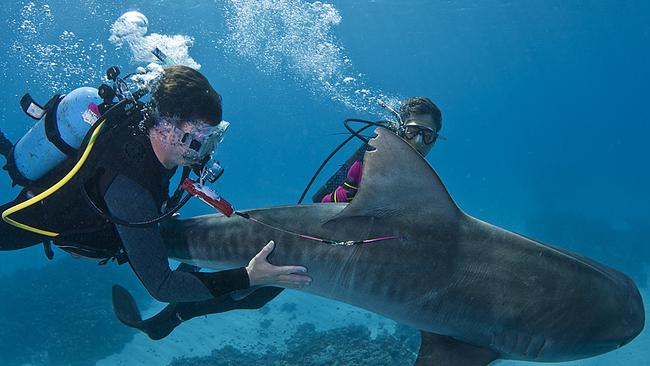Monster 200kg, 3m bull shark caught off popular Duranbah Beach on Australia Day prompting expert warnings
A MONSTER 200kg, 3m bull shark has been caught off a well-used Gold Coast beach as experts warn we should expect to see more of the deadly species.

A MONSTER 200kg, three-metre bull shark has been caught off popular Duranbah Beach as experts warn the deadly species is more active following recent wet weather.
Danielle Simpson and her boyfriend Joel Merchant, a professional fisherman, were on an Australia Day fishing trip off the southern Gold Coast when the shark took a set line.
Ms Simpson said that it was the first shark catch she had been part of.
“It was exciting for me,” she told the Gold Coast Bulletin.
“It was a pretty amazing thing to watch and be a part of. I have been out with him a couple of times but that was my first shark.
SIGNS WARN OF SHARK DANGER IN GOLD COAST CANALS


“I did have that moment where I was like, if this thing falls on me I am going to scream, but I knew I was safe.
“The surprising thing is actually how many are out there — people don’t realise.”
The adult bull shark was later cut up and processed.
Ms Simpson said she would be back on the water for more shark action soon.
“That’s what we enjoy,” she said.
“It is an amazing feeling just being that close to something that big.
“It was very exciting.”
The giant haul comes at the tail end of the pupping season when the sharks drop off their newborns and return offshore before the next mating season.
Mr Merchant said more bull sharks were out there than people realised.
“There are heaps,” he said.
“I don’t think people understand the actual amount of sharks that are out there.
“It’s not just bull sharks, it’s all sharks in general.
“People say to me, ‘How many sharks do you see?’ and I just say if people saw what my eyes see, no one would ever swim.”
Bull sharks can reach 3m while juvenile and large juvenile animals are often spotted in canals.
The species is thought to have been responsible for the city’s most recent fatal attacks in 2002 and 2003.
Bull sharks are primarily tropical and are more prevalent further north.

Ocean and Coast Research Shark Research Scientist Dr Jonathan Werry said that when murky water mixed with the salt water, particularly after rain periods, large sharks were more prevalent.
“We have tracked a number of these big animals and following where they have been going over the last couple of years,” he said.
“What’s been quite clear is that they do move right up and down the Coast.
“They have specific patterns they follow and the bull shark, part of that is seasonal but also driven by mating requirements and also feeding requirements.
“Basically what is very important for people in beach areas is when you get murky water coming out of the river systems and then entering our beach waters and mixing with salt water, that becomes a productive area for fish and, particularly during summer periods, that increases the likelihood of big sharks.”



